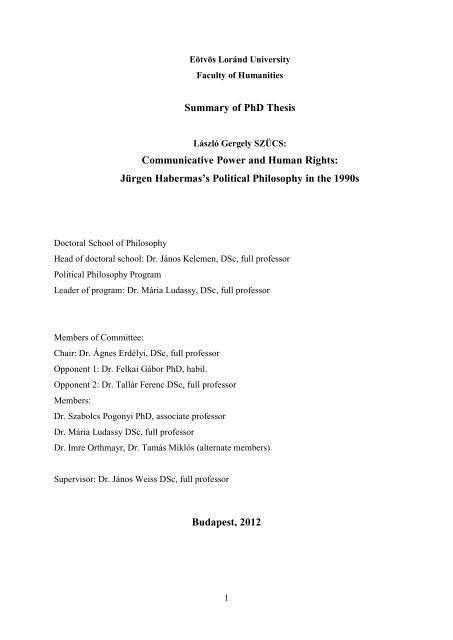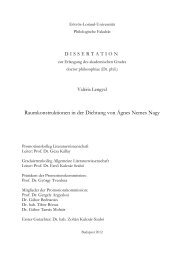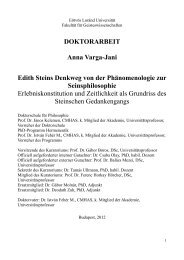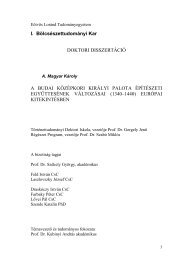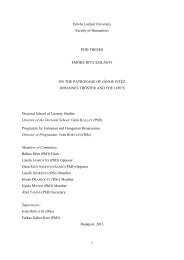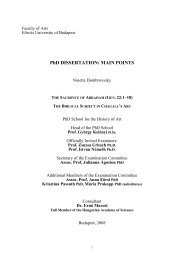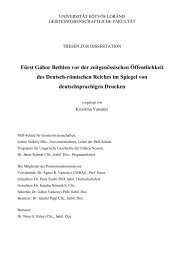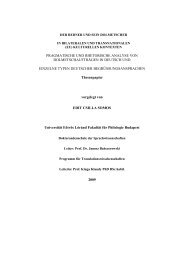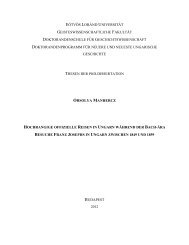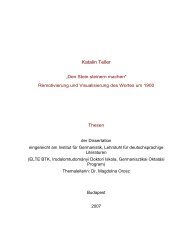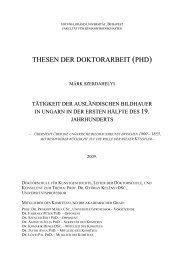Summary of PhD Thesis Communicative Power and Human Rights ...
Summary of PhD Thesis Communicative Power and Human Rights ...
Summary of PhD Thesis Communicative Power and Human Rights ...
Create successful ePaper yourself
Turn your PDF publications into a flip-book with our unique Google optimized e-Paper software.
Eötvös Loránd University<br />
Faculty <strong>of</strong> <strong>Human</strong>ities<br />
<strong>Summary</strong> <strong>of</strong> <strong>PhD</strong> <strong>Thesis</strong><br />
László Gergely SZÜCS:<br />
<strong>Communicative</strong> <strong>Power</strong> <strong>and</strong> <strong>Human</strong> <strong>Rights</strong>:<br />
Jürgen Habermas’s Political Philosophy in the 1990s<br />
Doctoral School <strong>of</strong> Philosophy<br />
Head <strong>of</strong> doctoral school: Dr. János Kelemen, DSc, full pr<strong>of</strong>essor<br />
Political Philosophy Program<br />
Leader <strong>of</strong> program: Dr. Mária Ludassy, DSc, full pr<strong>of</strong>essor<br />
Members <strong>of</strong> Committee:<br />
Chair: Dr. Ágnes Erdélyi, DSc, full pr<strong>of</strong>essor<br />
Opponent 1: Dr. Felkai Gábor <strong>PhD</strong>, habil.<br />
Opponent 2: Dr. Tallár Ferenc DSc, full pr<strong>of</strong>essor<br />
Members:<br />
Dr. Szabolcs Pogonyi <strong>PhD</strong>, associate pr<strong>of</strong>essor<br />
Dr. Mária Ludassy DSc, full pr<strong>of</strong>essor<br />
Dr. Imre Orthmayr, Dr. Tamás Miklós (alternate members)<br />
Supervisor: Dr. János Weiss DSc, full pr<strong>of</strong>essor<br />
Budapest, 2012<br />
1
The starting point <strong>of</strong> my research is Jürgen Habermas’s philosophy in the 1990s, with special<br />
regard to his works Faktizität und Geltung <strong>and</strong> Die Einbeziehung des Anderen. In these<br />
works, Habermas elaborates the three main ideal types <strong>of</strong> the theory <strong>of</strong> normative democracy:<br />
the liberal, the republican <strong>and</strong> the deliberative ones, <strong>and</strong> he describes his own deliberative<br />
theory as the synthesis <strong>of</strong> the other two models. He argues that in the framework <strong>of</strong><br />
deliberative (discourse) theory, contradictions can be resolved between liberal political theory<br />
that supports the inviolability <strong>of</strong> subjective liberal rights <strong>and</strong> <strong>of</strong> the individual person, <strong>and</strong> the<br />
republican political theory that underlines the importance <strong>of</strong> the sovereignty <strong>of</strong> people,<br />
discursivity, <strong>and</strong> ethical self-interpretation. In my research, I primarily aim to review the<br />
success <strong>of</strong> this very synthesis <strong>of</strong> Habermas’s. I. How is the protection <strong>of</strong> human rights<br />
possible in a democracy based on broad discourse? II. How is it possible to guarantee the<br />
integration <strong>of</strong> political society in deliberative democracy that ensures free choice <strong>of</strong> values?<br />
III. How is political consensus possible among citizens with different ethical convictions?<br />
I. First, I examine the possibility <strong>of</strong> democratic decision making based on rational discussion<br />
that does not breach universal human rigths <strong>and</strong> classic liberal rights in a plural political<br />
society. This problem could be solved theoretically, if all principles were excluded from open<br />
debate. For Habermas on the other h<strong>and</strong>, this solution would mean that political discourse is<br />
limited arbitrarily <strong>and</strong> theoretically: this would lead to breach citizens’ „pozitive freedom”<br />
that enables them to decide how to live their lives. It is possible to breach the liberal rights to<br />
dignity <strong>of</strong> marginalised social groups as well: political discourse based merely on universal<br />
norms cannot trace back the hidden historical <strong>and</strong> traditional forms <strong>of</strong> suppression.<br />
Habermas’s train <strong>of</strong> thought underlines that the validity <strong>of</strong> subjective liberal rights in a<br />
society being either plural or based on a strictly traditional background consensus does not<br />
emerge from the universal or neutral discourse <strong>of</strong> the members <strong>of</strong> a political community;<br />
basic rights can be identified as legal-formal conditions <strong>of</strong> discourse at the level <strong>of</strong> the<br />
constitutional state. Habermas’s argumentation reveals that the classic liberal rigths are the<br />
legal community’s context-dependent interpretations <strong>of</strong> a type <strong>of</strong> basic rigths, that is, <strong>of</strong><br />
subjective liberal rights that are prerequisites <strong>of</strong> the institutionalization <strong>of</strong> legal codes <strong>and</strong> <strong>of</strong><br />
the discursive practice <strong>of</strong> political autonomy. On the other h<strong>and</strong>, I demonstrate that it is<br />
difficult to accept Habermas’s idea <strong>of</strong> ’liberal rights’ from a liberal perspective. It contradicts<br />
liberal intentions that liberal rights cannot be grasped as universally clear concepts; members<br />
<strong>of</strong> a legal community can only judge violation <strong>of</strong> law on the basis <strong>of</strong> their own tradition. The<br />
problem from the liberal point <strong>of</strong> view is that Habermas does not deduce the validity <strong>of</strong><br />
2
subjective liberal rights from the protection <strong>of</strong> the individual person as value but from the<br />
institutionalization <strong>of</strong> legal codes necessary to exercise power openly.<br />
I demonstrate that in Habermas’s point <strong>of</strong> view, human rights protected by liberals <strong>and</strong><br />
the sovereignty <strong>of</strong> people protected by republicans can only be reconciled by the application<br />
<strong>of</strong> discourse theory: as long as citizens keep in mind the rational expectations <strong>of</strong> discourse<br />
principle, they can make decisions without breaching human rights. Habermas’s striving for<br />
synthesis can only be successful, if it is possible to justify the famous discourse principle <strong>of</strong><br />
his <strong>and</strong> to prove that the use <strong>of</strong> discourse principle in legislation does not have any disastrous<br />
consequences. I answer one <strong>of</strong> Habermas’s critiques who doubts both <strong>of</strong> these. According to<br />
Steinh<strong>of</strong>f’s interpretation, in the sense <strong>of</strong> the discourse principle a norm or law is legitimate if<br />
it acquires general consensus <strong>of</strong> „legal companions”; as it is impossible to reach general<br />
consensus <strong>of</strong> all mankind concerning human right issues, human right norms cannot be<br />
legitimate in the sense <strong>of</strong> the discourse principle. In Steinh<strong>of</strong>f’s opinion, if a general<br />
consensus <strong>of</strong> all mankind is still possible or the majority’s resolution is enough to justify the<br />
norms <strong>of</strong> the constitutional state, then it is possible that in the sense <strong>of</strong> the discourse principle<br />
such a decision is made that undermines the validity <strong>of</strong> the norms <strong>of</strong> the constitutional state.<br />
Furthermore, if Habermas’s statement that conditions <strong>of</strong> rational discussion in an<br />
argumentation (for example the validation <strong>of</strong> human rights) have to be „accepted as<br />
adequately realised” in order to avoid performative contradiction was taken seriously, it<br />
would be impossible to declare disenfranchisement without contradictions.<br />
In the first place, I show that Habermas’s discourse principle can be reconstructed by<br />
reviewing the crucial presuppositions <strong>of</strong> a serious argumentation. In my analysis I answer<br />
Steinh<strong>of</strong>f’s criticism that it is impossible to describe disenfranchisement without<br />
contradictions by the use <strong>of</strong> Habermas’s discourse ethics. With the help <strong>of</strong> K. O. Apel’s<br />
analyses, it is possible to present that performative contradiction does not express statement <strong>of</strong><br />
facts (for example about the validation <strong>of</strong> human right norms) but claims something that<br />
contradicts to the implicit claims <strong>of</strong> one’s argumentation. Contrary to Steinh<strong>of</strong>f’s criticism, I<br />
also point out that direct approval <strong>of</strong> the result is no basic condition <strong>of</strong> making a legitimate<br />
decision, as minimal consensus necessary to legitimacy consists <strong>of</strong> the recognition <strong>of</strong> the<br />
norms <strong>of</strong> rational debate. This way the critical opinion that decisions violating discursivity<br />
can be made in Habermas’s constitutional state can be averted.<br />
Instead <strong>of</strong> Steinh<strong>of</strong>f’s explanation, I find the problem <strong>of</strong> the synthesis <strong>of</strong> human rights<br />
<strong>and</strong> the sovereignty <strong>of</strong> people in the fact that Habermas uses a process model to unite the<br />
universal aspect necessary to legal protection with the particular ethical aspect. Habermas<br />
3
describes the context-dependent ethical <strong>and</strong> the universal moral discussions as different stages<br />
in the composition <strong>of</strong> political opinion <strong>and</strong> will, thus, his process model makes it impossible<br />
for citizens to consider disputed norms both from a universal moral perspective <strong>and</strong> from an<br />
ethical point <strong>of</strong> view which reflects the contexts <strong>of</strong> oppression at the same time.<br />
II. In the second part <strong>of</strong> my dissertation, I show that Habermas wishes to develop a<br />
theory <strong>of</strong> integration based on the law <strong>of</strong> reason that provides citizens the possibility <strong>of</strong><br />
integration based on free choice instead <strong>of</strong> nationalist conceptions <strong>and</strong> that can also answer<br />
the question <strong>of</strong> how it is possible to ensure the coherence <strong>of</strong> political society with the<br />
disappearance <strong>of</strong> nation states. I also show that the development <strong>of</strong> Habermas’s theory <strong>of</strong><br />
political integration has been influenced by republican / communitarian ideas about active<br />
citizenship: he accepted that the atomized individuals driven by their own interests are unable<br />
to integrate in the constitutional state because only along shared values <strong>of</strong> the community can<br />
those values develop that allow them to identify themselves with fellow citizens <strong>and</strong><br />
institutions. 1 This is why Habermas states that a political society based on voluntary consent<br />
<strong>and</strong> providing cohesion at the same time can develop, if the citizens identify themselves from<br />
the point <strong>of</strong> view <strong>of</strong> self-interpretation with principles <strong>of</strong> the constitutional state that ensure<br />
free action <strong>and</strong> are embedded in common political culture. This form <strong>of</strong> identification is called<br />
„constitutional patriotism.”<br />
Habermas’s constitutional patriotism raises some questions. On the one h<strong>and</strong>, it does<br />
not consider the crisis deriving from the fact that citizens are motivated rather by their<br />
particular ethical convictions than by general political principles. On the other h<strong>and</strong>, from the<br />
liberal perspective it is questionable whether the “ethical impregnation” <strong>of</strong> the re-evaluated<br />
principles <strong>of</strong> the constitutional state from the point <strong>of</strong> view <strong>of</strong> historical self-interpretation can<br />
be reconciled with equal treatment necessitated by the constitutional state.<br />
Answering the first question, I show that Habermas does not describe the legal norms<br />
exhibited by the institutions <strong>of</strong> the constitutional state merely as procedural <strong>and</strong> customized<br />
but as reacting sensitively to the values <strong>and</strong> aims <strong>of</strong> particular communities, big or small. As<br />
the fundamental condition <strong>of</strong> cooperation at the level <strong>of</strong> the constitutional state is that<br />
institutions <strong>of</strong> the constitutional state reflect the values <strong>of</strong> the changing political community, it<br />
is not possible to agree with the critical opinion that Habermas has underestimated the<br />
1 Habermas: Staatsbürgerschaft und nationale Identität (1990), in. Faktizität und Geltung – Vorstudien und<br />
Ergänzungen, Suhrkamp Verlag, Frankfurt am Main, 1992, 641-642. Történeti tudat és poszttradicionális<br />
identitás. Megjegyzések az NSZK nyugati orientációjáról (1987), in. Szociológiai Figyelő, 1989/4. 12.<br />
4
integrating power <strong>of</strong> traditional bonds <strong>and</strong> self-interpretations. He describes legislation as a<br />
process in which members with different life-forms <strong>of</strong> an always changing society re-interpret<br />
principles <strong>of</strong> the constitutional state in the light <strong>of</strong> changing membership <strong>and</strong> relevant<br />
experience.<br />
On the other h<strong>and</strong>, it is clear that Habermas in his essay Kampf um Anerkennung im<br />
demokratischen Rechtstaat makes compromise in important aspects with liberal views that<br />
declare the importance <strong>of</strong> political pluralism: in Habermas’s opinion, although constitutional<br />
patriots identify themselves with ethical contents <strong>of</strong> the dominant interpretation <strong>of</strong> political<br />
culture <strong>and</strong> <strong>of</strong> principles <strong>of</strong> the constitutional state (or at least they are motivated emotionally<br />
to become members <strong>of</strong> an interpretational community), they continue to “cherish” neutral<br />
principles inherent in dominant interpretations. Keeping in mind the neutral “core” <strong>of</strong> legal<br />
principles can become important reference point for those who cannot identify themselves<br />
with the dominant interpretations <strong>of</strong> political society, it can create opportunity to transform<br />
political culture, <strong>and</strong> it can revise oppressive aspects <strong>of</strong> traditional life-forms. According to<br />
this more differentiated form <strong>of</strong> constitutional patriotism, political culture does not express a<br />
united, conflict-free self-interpretation <strong>of</strong> the community <strong>of</strong> citizens. Habermas’s “political<br />
culture” is rather the depositary <strong>of</strong> an “interpretational horizon.” Citizens are bound not by<br />
their common <strong>and</strong> unchanging interpretations <strong>of</strong> themselves <strong>and</strong> <strong>of</strong> the principles <strong>of</strong> the<br />
constitutional state but rather by their mutual effort to develop interpretations that correspond<br />
to relevant historical experiences. However, I also highlight the tension between this very<br />
concept <strong>of</strong> constitutional patriotism <strong>and</strong> the originally accepted republican premise which<br />
states that citizens are motivated to act in accordance with constitutional principles only if<br />
they can identify themselves with these principles from the point <strong>of</strong> view <strong>of</strong> common political<br />
culture that counts on everyone’s emotional identification. Thus, it seems that according to the<br />
more differentiated model <strong>of</strong> political integration, mobilizing power <strong>of</strong> the principles <strong>of</strong> the<br />
constitutional state are needed the most when members <strong>of</strong> a background minority strive for<br />
full membership <strong>and</strong> for transformation <strong>of</strong> the dominant self-interpretation, that is, when they<br />
still do not have the “horizon” <strong>of</strong> common political values.<br />
III. I examine Habermas’s idea on how citizens with different ethical convictions <strong>and</strong><br />
world views can reach political consensus from the point <strong>of</strong> view <strong>of</strong> Habermas’s acceptance<br />
<strong>of</strong> the solution to this question <strong>of</strong>fered by the rawlsian overlapping consensus. In Habermas’s<br />
opinion, the possibility <strong>of</strong> the rawlsian overlapping consensus lies in the “division <strong>of</strong> labour”<br />
between the private persons’ philosophical-metaphysical reason <strong>and</strong> the citizens’ public-<br />
5
political reason. Private persons support their world views <strong>and</strong> ethical convictions on the basis<br />
<strong>of</strong> their “participant perspective” <strong>and</strong> they can accept justice principles derived from<br />
monological generalising processes from these points <strong>of</strong> view. In Habermas’s opinion, Rawls<br />
thinks that there can be such an agreement among principles interpreted in the contexts <strong>of</strong><br />
private world views <strong>and</strong> ethical convictions that citizens can identify as reasonable consensus<br />
on the basis <strong>of</strong> their “observer perspective.” In the rawlsian theory this consensus determines<br />
the group <strong>of</strong> legitimate political norms.<br />
From Habermas’s point <strong>of</strong> view, it is possible to criticize this opinion by stating that it<br />
contradicts one’s intuition <strong>and</strong> undermines agreement if the moral <strong>and</strong> ethical ground <strong>of</strong> the<br />
foundation <strong>of</strong> “consensus” is regarded as incapacity for consensus <strong>and</strong> is not debated publicly.<br />
Furthermore, it is another problem from Habermas’s point <strong>of</strong> view that in case publicly<br />
verifiable criteria <strong>of</strong> rationality are neglected before the development <strong>of</strong> political consensus, it<br />
is impossible to resolve conflict among persons who act in accordance with the normative<br />
expectations <strong>of</strong> their own ethical convictions <strong>and</strong> to explain how overlapping consensus can<br />
come about.<br />
I show that in Habermas’s opinion these problems can be solved, if rational norms <strong>of</strong><br />
public reason are verified at the moment <strong>of</strong> the articulation <strong>of</strong> ethical or moral convictions <strong>of</strong><br />
persons striving for consensus. Thus, it is possible to rely on rational norms already at the<br />
beginning <strong>of</strong> the development <strong>of</strong> consensus. By the assumption <strong>of</strong> these rational norms it is<br />
easier to explain why it is compulsory to strive for rational difference <strong>of</strong> opinions <strong>and</strong> to<br />
appeal to general moral or political norms in case <strong>of</strong> ethical difference <strong>of</strong> opinions. However,<br />
I also point out that Habermas’s analysis <strong>of</strong> Rawls does not give any further reference on what<br />
the sufficient conditions are <strong>of</strong> developing a fair political system <strong>of</strong> institutions. It is still a<br />
question whether it is enough for the foundation <strong>of</strong> a fair political system <strong>of</strong> institutions to<br />
agree about what procedural actions are to be taken when value conflicts seem to be<br />
insolvable; or a fair political system <strong>of</strong> institutions always has to be founded on a widely<br />
accepted concept <strong>of</strong> justice or on the development <strong>of</strong> a wider value consensus.<br />
6
List <strong>of</strong> my publications related to the topic <strong>of</strong> my dissertation<br />
László Gergely Szücs: How is a Constitutional Democracy Possible without any Nation?<br />
Jürgen Habermas <strong>and</strong> the Theory <strong>of</strong> Political Integration, in Valóság 2012/55.<br />
László Gergely Szücs: The Discourse Principle as the Guarantee <strong>of</strong> the Constitutionality –<br />
Investigations in Connection with a Radical Habermas Criticism in Magyar Filozófiai Szemle<br />
2011/2.<br />
László Gergely Szücs: The Status <strong>of</strong> <strong>Human</strong> <strong>Rights</strong> in Habermas’ Theory <strong>of</strong> Deliberative<br />
Democracy in Politikatudományi Szemle, 2010/4.<br />
7


